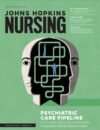Contributions to care remain hard to define
A higher power has yet to provide concrete answers to the role spirituality plays in prevention, treatment, and recovery from substance abuse. Until one does, mere mortals will struggle even to define “spirituality” and differentiate it from “religion.” But try we must, argues Associate Professor Joan Kub, PhD, MA, PHCNS, BC, in a guest editorial (with P. Ann Solari-Twadell, RN, PhD, MPA, of Loyola University Chicago) in the December 2013 Journal of Addictions Nursing.
“Because it is difficult to differentiate religion from spirituality, conceptualization and measurement issues often result in conflicting as well as confusing findings,” the editorial says.
Spirituality is a central tenet of 12-step recovery programs like Alcoholics Anonymous. Its value, particularly regarding alcohol addiction, has been recognized by many healthcare practitioners as well. But what does research science say about the role spirituality plays in addictions care? The issue of the Journal of Addictions Nursing co-edited by Kub, an addictions expert at the Johns Hopkins School of Nursing, was dedicated to that very topic. Featured articles by Kub and Hopkins Nursing colleagues Benita Walton-Moss, DNS, RN, CRNP; Ellen M. Ray, DNP, RN; and Kathleen Woodruff, MSN, CRNP, found answers to those questions are not always readily available.
But if hard data are difficult to come by, in a question-and-answer session with Fran Ludwig, MS, RN, who has been actively engaged in integrating spirituality into healthcare for decades, Kub learns that at least attitudes have begun to change.
“I graduated with my Bachelor of Science degree in the 1970s and immediately went into psychiatric nursing. The mention of spirituality or God was rather taboo in that area, and rarely did I hear or see any aspect of this on the unit except if the clergy came to visit a patient,” Ludwig tells Kub. “Today, the importance of spirituality and health is much more acceptable throughout healthcare. … We are beginning to realize that we cannot just care for one part of the patient but, instead, must view the patient in a holistic manner: mind, body, and spirit.”
Kub concludes, “With more information, practitioners in the addictions field can gain a better understanding of spiritual resources and provide information about them to patients at risk for or trying to overcome an addiction.”
[button link=”http://journals.lww.com/jan/Citation/2013/10000/Spirituality_in_Addictions_Research__Addressing.2.aspx” preset=”blue”]Read Article[/button]

